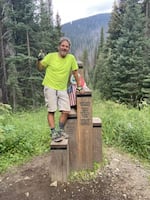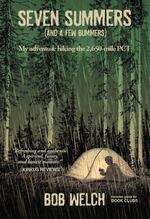
Eugene author Bob Welch made it to the end of the Pacific Crest Trail in Canada on August 10, 2022, with his hiking partner and brother-in-law Glenn Peterson.
Glenn Peterson / Courtesy Of Bob Welch
The latest book by Eugene author Bob Welch is called “Seven Summers (and a few Bummers): My Adventures on the 2,650-mile Pacific Crest Trail.” Welch is a former Register-Guard columnist and author of several books. He recently spoke with KLCC’s Rachael McDonald.
Rachael McDonald: So, what was your motivation for hiking the Pacific Crest Trail in its entirety?
Bob Welch: I think, curiosity [is] what comes to mind, and being at a point in my life where my kids were grown and gone and I had done a lot of backpacking earlier and I kind of wanted to revisit the trails. Then, in 1999, I met a woman named Laura Buhl by little Belknap Crater. I was doing a little day hike and I said, “Where did you start?” And she said, “In Mexico,” and I almost fell off my rock, and said, “Where are you finishing?” She said Canada.
So, on that day in August of ‘99, Laura Buhl introduced me to the trail. I had no idea it even existed. And so that planted that seed that grew to fruition about 12 years later. Because, in 2011 I decided to try to do the Oregon portion of it. And then that led, frankly, to the entire trail.
McDonald: You didn’t do the whole trail in one season as some people do. And you actually took more than seven summers to hike the trail.
Welch: Many more! Yeah, we took 10 summers over an 11-year span. It took 17 sections. So, a lot of through-hikers will start in late March, early April, and they will start in Mexico and fight their way through the high Sierras, the leftover snow in June, and arrive in late September, October. What we did, when we finally decided to do the whole thing, was just hop all over the trail like a couple of pinballs going north and south — California, Washington, Oregon. And so, ours was a very discombobulated trip. But, as one of the reviewers said, interesting because of that. Because there’s a lot of good books about the PCT, but most are just lineal. They start in Mexico and end in Canada, but we’re all over the place. And life gets in the way at times, people die, aging parents get old. There’s a pandemic in there somewhere. But we finally got it done on August 10th of 2022. And here we are, a little more than a year later, with the book.
McDonald: Yeah, you mentioned things happened. There more than a few bummers, including loved ones dying, illness — and also fires.
Welch: Fires, increasingly, are a problem for PCT hikers. They always have been, but increasingly in the last decade or so. And then, of course, this year with the heavy snows in California, it’s really never been harder to hike the PCT since the addition of the app.
The PCT app came in 2012 and it will tell you where water is, campsites, where you can resupply, things like that. That made the trail a whole lot easier. The real heroes are the people who did it starting back in the ‘70s who did not have frameless packs and did not have apps telling them how far they had before the next water stop or something like that. But fire is definitely making it tougher.
McDonald: One of the things that stuck out to me was you climbed Mount Whitney twice while doing this hike. It’s not even really part of the PCT. What was it like to be at the highest spot in the Continental U.S.?
Welch: Amazing. And both times we caught sunrises there because we left at a place called Guitar Lake at 1 a.m. and we’re up to the top of Whitney by about 5 a.m. It is not a technical climb. Nor am I a technical climber. My Corvallis High classmate Jon Krakauer, a great author, he does that stuff. I’m into “adventure light.” But it was just beautiful.
You sort of look down and it’s almost like you’re in a hot air balloon or a commercial airliner looking down because you see the spines of all of these mountains. And California has over 500 peaks of 12,000 [feet] or more. And it’s just another world down there. Just gorgeous. But cold and windy. And we were anxious to get down. Little did I know that the way down to the Whitney Portal would actually be more difficult than the way up.
McDonald: Now, your companion on the trail was your brother-in-law, Glenn. After spending so many summers hiking with him, do you feel like you need a new project with him?

The latest book by Eugene author Bob Welch is “Seven Summers (and a few Bummers): My Adventures on the 2,650-mile Pacific Crest Trail.”
Courtesy Of Bob Welch
Welch: I feel like I need a break from him! No, actually, we just got through doing 123 miles from the Columbia River to Pamelia Lake on the PCT going north to south. ... I enjoyed it so much because we didn’t do as much. We did 10 to 12 [miles] per day. And, we took time in the afternoon to read and relax and just kind of reflect, and I really enjoyed it. Because when you’re on the PCT you’re trying to get it done. You have deadlines. And, my whole life has been deadlines. So, I think that what I proved a couple of weeks ago was I love the trail and I love hiking with my brother-in-law. It’s not like I love Canada. You know, I have to get to the end, or anything like that. So, it was really enjoyable.
McDonald: What do you hope people take away from reading this book?
Welch: I think that there’s a lot to be said for living life with a sense of adventure. And as I point out in my afterword [to the book], I don’t think adventure necessarily means having to put on a pack and hike 2,650 miles. It can be as nonactive as holding someone’s hand during a cancer treatment, or as internal as overcoming an addiction. Adventure, I broadly define it. But, I think that a lot of us, I think we allow others to live our adventures. We watch television, we watch athletes, we watch entertainers, none of which is bad, of course. But, at some point, we’ve got to get in the game, we’ve got to get out there and do something.
And I just can’t imagine not having hiked the PCT now that I’ve gone through it. The people I met from all over the world. Having five kids, one from Australia, one from Sri Lanka, stay with us for a night, a year ago last summer, because they were stymied down in Shasta City and I had met them on the trail and said, “hey, call me if you’re in any trouble coming through Oregon.” I love that. What’s around the next bend? What’s over the next path? Who are you going to meet? And, again, the trail is 40% international now, 40% women.
And it’s changed in the last few years. We saw it changing. It became more female and more international in the just the 11 years we were on it. Just some amazing people, very few bad experiences. And, and a whole lot of great experiences with people.
There’s a kickoff event for Bob Welch’s book from 5-7 p.m. Monday at the Heritage Courtyard in the Oakway Center in Eugene.
Editor’s note: this interview has been edited for clarity.
Copyright 2023 KLCC.